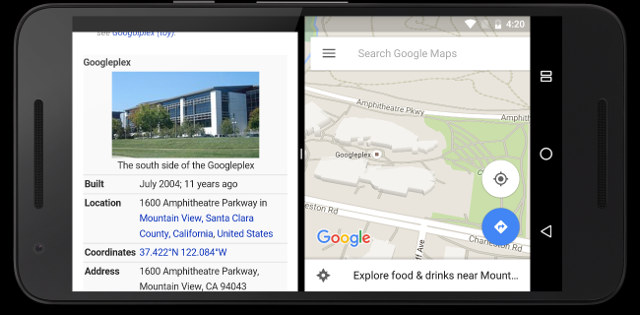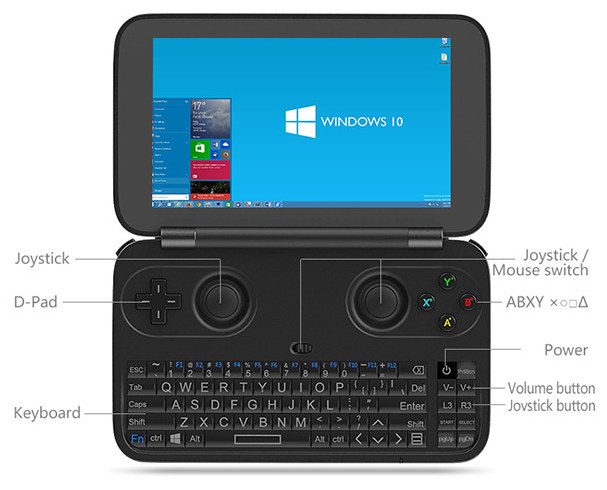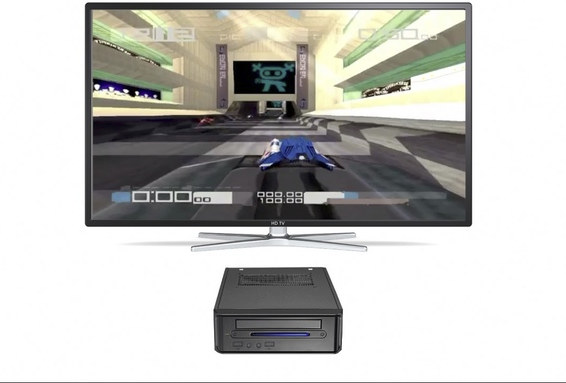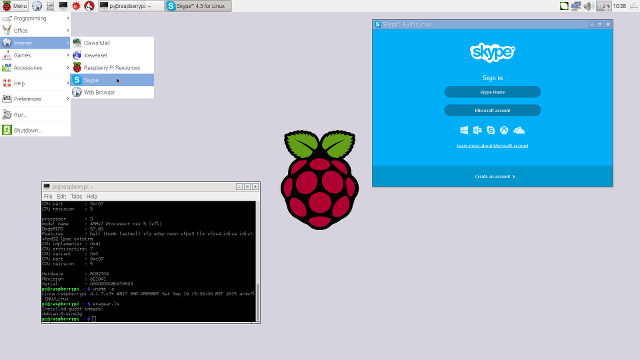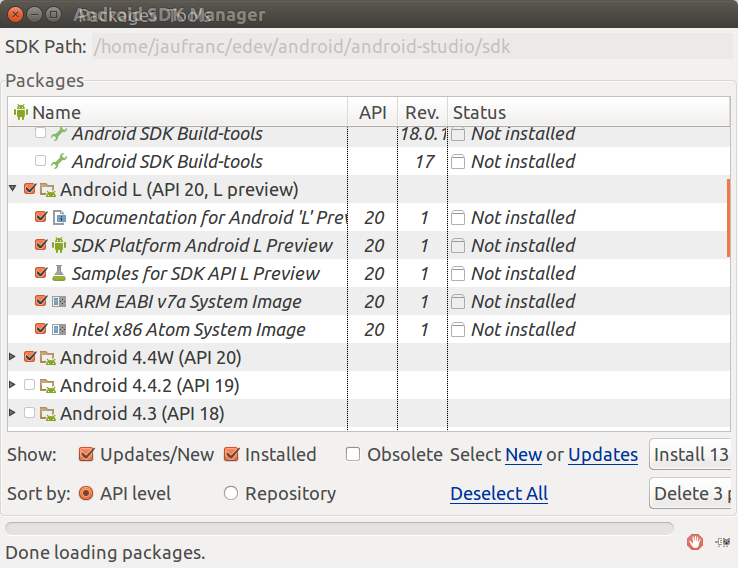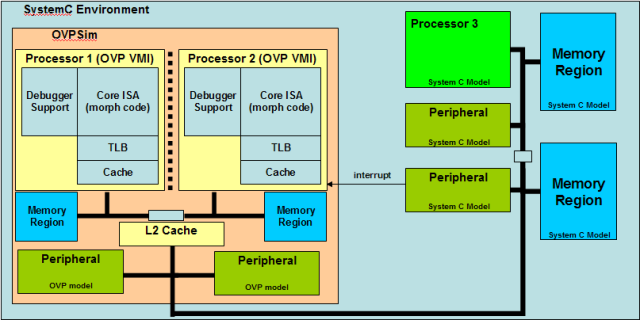Google has just released an early developer preview of Android 7.0 N (Nutella?) before the OS officially launched later this summer with new features such s multi-window support, TV recording, Picture-in-picture, bundled notifications, and efficiency improvements. So let’s have a look at some of improvements: Multi-window – A new manifest attribute called android:resizableActivity is available for apps targeting N and beyond, allowing your activity to be launched in split-screen modes on phones and tablets. In addition, activities can also go into picture-in-picture mode on devices like TVs by setting android:supportsPictureInPicture to true. Direct reply notifications: Initially an Android Wear only features, the RemoteInput notification API has now been added for smartphones and tablets, and allows user to reply directly within the notification shade. Bundled notifications – The Notification.Builder.setGroup() method can be used to bundle notifications from the same app together. Efficiency Improvements – Doze has been further improved to save […]
GPD Win Windows 10 Portable Gaming Console Launched on Indiegogo for $299
We already knew that GPD HK was working on a Windows 10 handheld gaming console powered by an Intel Atom x5-Z8500 Cherry Trail processor, and the company has now decided to launch what they now call “GPD Win” on Indiegogo for $299, and advertise it as a “5.5” Game Handheld Laptop”.GPD Win specifications: SoC – Intel Atom x5-Z8500 quad-core Cherry Trail processor @ 1.44/2.24 GHz (Burst) with Intel HD Gen8 graphics @ up to 600MHz System Memory – 4GB LPDDR3-1600 Storage – 64GB eMMC 4.51 flash + micro SD slot up to 128GB Display – 5.5″ capacitive touch IPS screen; 1280×720 resolution; Corning Gorilla Glass 3; full lamination technology Video Output- mini HDMI Audio – mini HDMI, 3.5mm headset jack, microphone and speaker; Realtek ALC5645 audio codec Connectivity – WiFi 802.11 b/g/n and Bluetooth 4.0 USB – 1x USB 3.0 port, 1x micro USB port HID – QWERTY keyboard with […]
Crowdfunded Projects Use Raspberry Pi and ODROID Boards into Home Theater PCs and Retro Game Consoles
I’ve been tipped about two separate projects launched on Indiegogo and Kickstarter that integrate Raspberry Pi or ODROID boards into their products. indieGO! retro gaming console and distribution leverages Raspberry Pi 2, ODROID-C1+, or ODROID-XU4 to play older games, while Pi2Media HT1 relies on either Raspberry Pi2, and later the upcoming UP Board or ODROID-C2 boards in order to offer a Surround 7.1 Home Theater PC. indieGO! Retro Game Console Beside the development board, indieGo! also includes a DVD-RW drive, an SD card reader, a mini-ITX case, a 3D-Printed I/O-shield and ARM board holder, a USB joypad, and two USB ports. indieGO!-OS is also a Linux distribution based on AEROS running Exagear which means both ARM (native) and x86 (emulation) executables will run on the device. Pre-isntalled programs include Wine, Kodi, Moonlight, AmiCloud, and EmuLA. The many emulators installed allow support for games running Playstation, C64, Dreamcast, Game Boy, Atari, Sega, PC, […]
Run x86 Linux and Windows applications in Raspberry Pi and other ARM Linux Devices with Exagear
A few weeks ago, I finally decided to buy a Raspberry Pi 2 board as it could always be useful for some testing, at least for comparison purposes. I ended up buying it from Ebay for $40, as it’s $3 to $5 more expensive locally. Nevertheless, I was not sure what I’ll use it first for, but after seeing a tweet for Exagear Desktop software that allows ARM boards to run x86 Linux or Windows applications, the latter through wine. The program is available for Raspberry Pi, Raspberry Pi 2, and ARMv7 devices for $19.95 to $29.95. I asked for a version for testing purposes, and I was given a Google Drive link to download Exagear for Raspberry Pi 2, as well as a 3-month trial key. Installation is very easy. I started by downloading and installing Raspbian Jessie the usual way on a 32GB micro SD card. It went […]
Mediatek Releases Android SDK with APIs for HotKnot, Video & Image Processing, Multi-SIM, etc…
Mediatek seems motivated in getting involved with maker and open source communities. Thanks to its works on Android One with Google, the company recently released the Linux kernel source for MT6582 processor, and with a separate endeavour, launched Mediatek Labs bringing LinkIt ONE platform for IoT and wearables to market, as well as a preview release of an Android SDK for its mobile processors. Features of the SDK includes: Set of libraries for MediaTek feature APIs with full API documentation. x86 MediaTek emulator based on a reference implementation of an Android 4.4.2 (KitKat) device powered by a MediaTek chip, adding capabilities to test and debug telephony and multi-SIM features, a vibrator indicator and a hot-swappable SD card. Customized version of the DDMS (Dalvik Debug Monitor Server), which adds support for testing telephony features, such as plugging and unplugging a headset, sending telephony commands to test call and SMS features, etc… […]
Some Projects on Nvidia Jetson TK1 Development Board: Nintendo Emulator, USB3 Webcam, and Robotics
Nvidia Jetson TK1 is a development board powered by the company’s Tegra K1 quado core Cortex A15 processor, and especially a Kepler GPU that allows for OpenGL 4.4. It has shipped to developers around April/May, and some of them have showcased their projects, or tested some hardware. Dolphin Emulator on Nvidia Jetson TK1 Dolphin is an emulator for Nintendo GameCube and Wii console that supports full HD (1080p) rendering, and run on Android, Linux and Mac OS, and there’s also an Alpha version for Android. Ryan Houdek (Sonicadvance1), one of Dolphin’s developers, has leveraged Kepler’s OpenGL support via Nvidia’s GPU drivers, to port the emulator to the platform running on Ubuntu, but it should work as well on Tegra K1 hardware running Android such as XiaoMi MiiPad tablet. You can watch Mario Kart: Double Dash demo running at full speed on the Nvidia board below. According to the developer, such […]
How to Try Android L Developer Preview in Ubuntu 14.04
As mentioned yesterday, Android L Developer Preview was about to be released, and this is now done with images for Nexus 5 “Hammerhead” and Nexus 7 “razor” available right now. However, if you don’t have either of these devices, or you’d rather not install a beta version on the phone you use everyday, you can still give a try in the SDK emulator. I’ve tried Android L myself in Ubuntu 14.04. Here’s what you have to do: Install Android Studio IDE in Ubuntu, and Create a new Project or open an existing project (Android Studio Version is now 0.61) Click on Tools->Android->SDK Manager in the top menu, and select the Android L (API 20, L Preview) packages as shown below, and click on “Install xx Packages” button. Accept the license as required, and click Install. This step can take countless hours… Now we’ll need to create a Virtual Device for […]
Imperas Releases ARM Cortex A53 & A57 Open Source Models for OVPsim
Since the end of 2012, it has been possible to use ARM 64-bit Fast models to run code compiled for the new ARMv8 architecture by emulating a 64-bit ARM processor inside an Intel / AMD processor. ARM fast models are not the only “free” option anymore, as Imperas has released OVPsim 20140430 with open source models for ARM Cortex A53 and Cortex A57 cores. OVPsim is a virtual platform that’s available free of charge for personal usage. The simulator itself (OVPsim) is closed source, but processor, peripheral and platform models are released under the Apache License version 2.0. OVP models of the ARM Cortex-A53 and Cortex-A57 are fully instruction accurate models, and you can use them for personal with an additional free license key, but if you want to make use of advanced features such as TrustZone and hardware virtualization you’ll need to purchase a commercial version (Imperas Developer or […]


